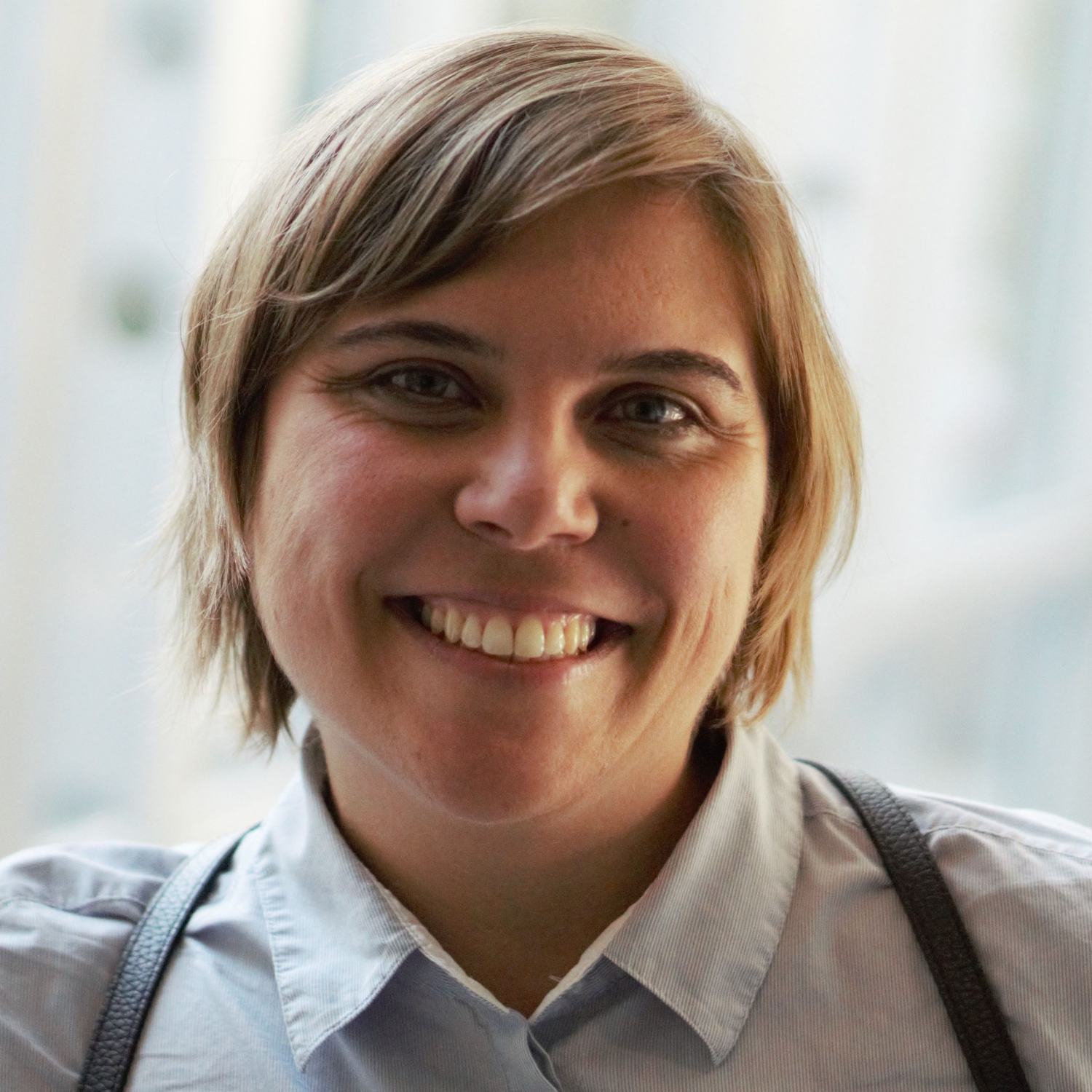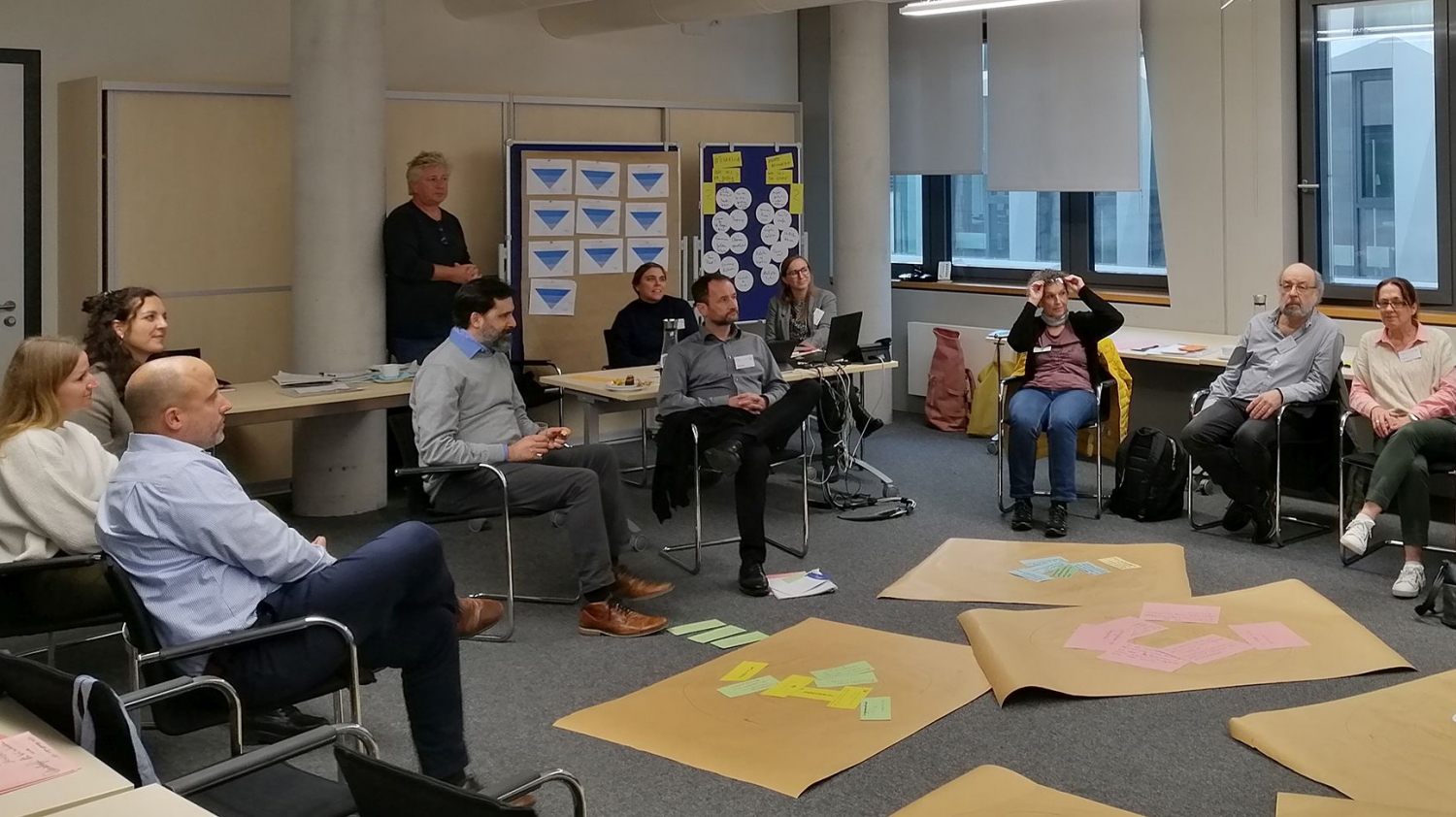How research supports and connects integration players

Kathrin Leipold is a cultural anthropologist, and she heard about the transfer project "Training programme for integration coordinators" via a job announcement – which she deleted at first, although her qualifications made her an excellent fit for the position. "The term 'integration' seemed like an outdated concept to me", the researcher says with a smile. "The next day, I pulled the advert out of my virtual recycling bin, because I just couldn't let it go". The fact that the position was for a transfer project really appealed to her. She applied for and got the job.
A person wearing many hats
Right when she joined the project in June 2021, Kathrin Leipold noticed how urgently integration staff wanted this training programme. Most integration coordinators come from different careers when they take on this position involving a topic that is highly charged politically. "They are given a pile of different hats to wear. This means that they need to work with administration staff and know the relevant processes – for example, how to present themselves and their work results well to the municipal council", Kathrin Leipold explains and adds, "At the same time, they need to be well-informed about the corresponding topics".
The topic of integration plays a role in a variety of discourses, global processes such as climate change, the north-south divide and many other areas. "There is an incredible variety of tasks and topical areas that integration coordinators need to know about", the researcher says. The goal of RISC Konstanz's transfer project was to develop a continuing education concept on a solid scientific basis that was just as multi-faceted. Kathrin Leipold emphasizes, "It is very difficult for integration coordinators to navigate these tasks all by themselves. They often work alone, and this is what I am hoping to change with this continuing education programme".
© Kathrin LeipoldTransfer is an exchange at eye level. The ideas of the integration coordinators are incorporated into the training concept.
Managing hurdles at the start of the project
When Leipold took over the project, it had been on hold for several months because her predecessor had started a new academic position. "Because of this month-long vacancy, my partners had gotten the impression that the project was not moving forward. It was extremely difficult to overcome this motivational hurdle and really bring myself and my ideas into play", the cultural anthropologist says. "However, I was very lucky to meet Stefan Schlagowsky-Molkenthin from the staff unit on integration for the city of Singen. Not only did he understand the risks resulting from the delay, but he was also open to collaboration and linked me up with the others".
Another challenge for Leipold was finding a common language. "Research and administration are completely different spheres. And it is really an experiment to try to bridge the gap with a transfer project", she says. In administration, there are a lot of regulations, procedures and hierarchies. And political "hot potato" issues, like integration, are like black boxes, inaccessible to researchers.
However, Kathrin Leipold chose to build bridges between research and everyday practice, and, bit by bit, she was able to promote awareness for her project.
Room for exchange
It's not enough for researchers to regularly share the results of their work. This was also a new experience for Leipold in the transfer project. "There must be room for exchange to shape the space between research and administration and fill it with life. This is where we generate transfer knowledge together. If this is missing, we just have two opposing poles – knowledge gained through research and knowledge that comes from practical application. We thus need room for exchange to make the transfer project a success".

"I understand transfer to be a very intensive collaboration with my practice partners – and this is how I run my project, too. For me, it's not about a one-dimensional transfer of scientific knowledge to players outside the university or the opposite, of practical knowledge to academia. Instead, it's about dialogue – in my case, between those involved in integration and those in research."
Kathrin Leipold
She works with the integration coordinators to define what the continuing education programme has to look like in order to fulfil their requirements. "They gave me the input that I then tried to translate into the programme. Our close collaboration revealed four key areas where training was needed", says Kathrin Leipold. "We started with a question that may sound simple: What are the responsibilities of integration coordinators? Working together to answer this question – at the national, state and local levels – means our programme offers participants a higher level of practical insight than anywhere else".
From assessing demand to designing the programme
The programme teaches the skills and methods required for the various topics that are the responsibility of integration coordinators: This includes education, the advancement of women, interfaith dialogue, leisure activities, inclusive sports and housing policy. In addition to this, integration coordinators wanted to keep tabs on the discourse on integration, for example, "Post-migration - what does that actually mean? Is this part of my everyday work?" Another important topic are questions involving self-administration: How can I organize my work as an integration coordinator?
In the meantime, word has definitely gotten out about the continuing education programme – all around Baden-Württemberg. Kathrin Leipold has a waiting list of people interested in taking part. Formats that foster exchange, such as the MittagsMeetingsIntegration (lunchtime integration meetings) via Zoom, are particularly popular: "Once a month, I invite an integration coordinator from a city, municipality or district to join us in a Zoom room. Anyone with time and interest can participate in the call. The fact that, each time, 40 to 50 people out of 220 such positions funded by the state meet up virtually demonstrates the popularity of this format. We talk about current topics and discuss problems practicians encounter".
What's next?
The programme's design phase concluded in May 2024, but how can its structures be passed on, and to whom? What does sustainable funding look like? What form of certification do participants need? "These are questions that researchers ordinarily wouldn't ask themselves", Kathrin Leopold says and adds, "and this is where I am now".
There is no legal requirement for integration coordinators to take part in continuing education, which Leipold sees as the first part of the problem. The state of Baden-Württemberg's administrative regulations for integration coordinators lay the foundation for their work. The regulations have been in place since 2013, which is one of a kind for Germany, but it does not include continuing education requirements. "When I speak with those responsible, I always emphasize that the administrative regulations must be updated to include a continuing education requirement, and I hope this will happen", the researcher adds.
Via a think tank, she stays in close contact with representatives of organizations representing municipalities at the state level in Baden-Württemberg, with the relevant state ministry in Stuttgart as well as important players in fostering integration. This think tank aims to promote the sustainability of the programme. In the recently approved project phase until 2029, the goal is to establish a platform presenting the continuing education programme and to develop a corresponding online portal that supports and connects integration players. In addition to promoting discussion, the project also aims to tackle questions of how to actively shape the discourse on integration. Along with advancing continuing education and networking, the platform will foster active participation on the topic and host event series or conferences focusing on integration policy topics.

